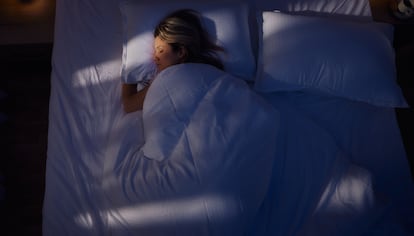The brain self-cleanses during sleep
How waste management works in the body’s most mysterious organ, and how sleep medications may interfere

You lie down, pull the covers up, and your body begins to relax into sleep. Muscles loosen, breathing and heart rate slow down. Brain waves change from an active state to a calmer state. Physical restoration is underway: tissue and immune system repair. All this happens in the first few hours of sleep. Then comes the deepest phase and with it the real action.
Every 50 seconds, a neuromodulator called noradrenaline invades the blood vessels of the brain, causing them to dilate and constrict, clearing the way for the cerebrospinal fluid to flow freely, carrying with it the dirt accumulated during the day in the most complex and mysterious organ of the body.
This is how, in broad strokes, the glymphatic system — the brain’s waste management and cleansing mechanism — works. Its existence was discovered more than a decade ago, but a study recently published in the journal Cell explains, for the first time, some of the mechanisms underlying how it works, such as the role of norepinephrine. Bearing the signature of Maiken Nedergaard, the Danish scientist who wrote about the original finding in 2012, the research also flags up the fact that sleeping pills can alter the effectiveness of the brain-washing system. The tests were conducted in mice.
“It all started with a quest to understand the body,” explains Gerard Mayà, a neurologist at Barcelona’s Hospital Clínic and coordinator of the working group on Movement and Behavioral Disorders during Sleep, who was not involved in the research. “It was very surprising that the brain was the only part of the body that was not reached by the body’s ‘official’ cleansing system, the lymphatic system. Then came the idea that it is such an impressive organ that it is capable of self-managing its waste.” What began as a theory became fact.
Natalie Hauglund, a neuroscientist at the University of Oxford and the University of Copenhagen who authored the Cell study, explains further: “When brain cells work, they produce material that is not used and is released outside the cells,” she says. “If these molecules accumulate, they can be toxic and can be linked to neurodegenerative disorders. For example, one of them is beta amyloid, a protein that can create plaques that are seen in many Alzheimer’s patients.” To prevent this accumulation, every night, during sleep, a flood of brain fluid washes all this debris away. But where does it end up? The waste is transferred to the body’s general cleansing system, where it is managed with the rest of the biological waste.
“One of the reasons why sleep is so important is that it allows the brain to perform all these maintenance tasks,” says Hauglund, who adds that it has not yet been possible to determine why the process can only happen during sleep. “It is probably because there are many fundamental cognitive processes going on during the day and cleaning cannot interfere with them,” she says.
Nor has it been possible to explain why every time the brain releases noradrenaline during sleep, there is a small flash of wakefulness. We are unaware of this, but the brain activity during these flashes looks more like when the brain is awake. “The data show that it’s not necessarily a bad thing that this happens,” Hauglund notes. “It’s a mystery and we need to figure out why this mechanism is there and what its function is while we sleep.”
Sleeping pills
The study has also shown that some sleeping pills can interfere with the brain’s self-cleansing system because they change the architecture of sleep. In March 2024, Carlos Egea, president of the Spanish Federation of Sleep Medicine Societies, announced that Spain has the highest consumption of sleeping meds in the world. Five million Spaniards depend on them to go to sleep every night.
“We found that while the pumping of noradrenaline in the brain is constant during natural sleep, drugs such as zolpidem [from the benzodiazepine family] inhibit its release, which causes the pumping of the cleansing fluid through the blood vessels to be lost,” Hauglund explains.
The scientists found that noradrenaline waves during deep sleep were 50% lower in zolpidem-treated mice than in mice that slept naturally. And although the medicated mice fell asleep faster, fluid transported to the brain was reduced by more than 30%. The study serves as a warning against this type of medication, especially regarding long-term use.
“We already know that hypnotics should not be the first choice for treating insomnia or other sleep disorders,” says Mayà. “These drugs work well in the short term, but they have adverse effects and generate tolerance. This new study throws up an additional reason to avoid them.”
“It’s not something we knew before, so science hasn’t taken it into account when developing these drugs,” Hauglund adds. “Now that we know that norepinephrine drives brain clearance, we can figure out how to get people to have a long, restful sleep.”
Meanwhile, for people with sleep disorders, there are no easy solutions. If a deep resting phase is not reached, the glymphatic system is not activated, so the brain remains dirty. That dirt, in turn, disrupts rest. “It becomes a vicious cycle,” Hauglund says.
Sign up for our weekly newsletter to get more English-language news coverage from EL PAÍS USA Edition
Tu suscripción se está usando en otro dispositivo
¿Quieres añadir otro usuario a tu suscripción?
Si continúas leyendo en este dispositivo, no se podrá leer en el otro.
FlechaTu suscripción se está usando en otro dispositivo y solo puedes acceder a EL PAÍS desde un dispositivo a la vez.
Si quieres compartir tu cuenta, cambia tu suscripción a la modalidad Premium, así podrás añadir otro usuario. Cada uno accederá con su propia cuenta de email, lo que os permitirá personalizar vuestra experiencia en EL PAÍS.
¿Tienes una suscripción de empresa? Accede aquí para contratar más cuentas.
En el caso de no saber quién está usando tu cuenta, te recomendamos cambiar tu contraseña aquí.
Si decides continuar compartiendo tu cuenta, este mensaje se mostrará en tu dispositivo y en el de la otra persona que está usando tu cuenta de forma indefinida, afectando a tu experiencia de lectura. Puedes consultar aquí los términos y condiciones de la suscripción digital.









































